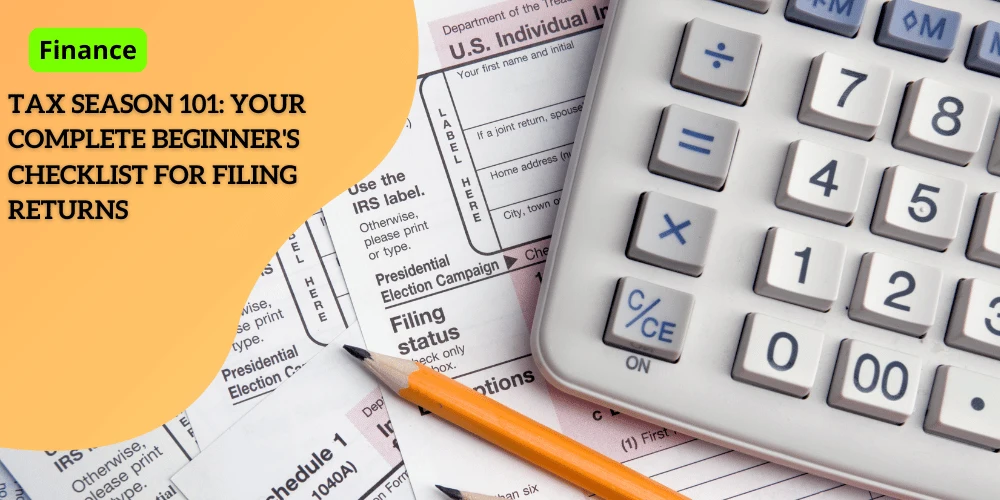Tax Season 101: Your Complete Beginner’s Checklist for Filing Returns

Anúncios
Do You Need to File? Understanding the Basics
IRS Income Thresholds and Filing Requirements for Different Status Categories
Understanding if you need to file a tax return starts with knowing the IRS income thresholds.
These thresholds depend on your filing status.
Anúncios
Generally, the IRS requires U.S. citizens and residents earning more than:
- 💵$14,600 for single filers
- 💵$21,900 for heads of households
- 💵$29,200 for married couples filing jointly if both are under 65
- 💵$5 for married people filing separately
If your income meets or exceeds these amounts, you must file a return.
Anúncios
Potential Benefits of Filing Even When Not Required
Even if you don’t meet the income threshold, filing a tax return can still be beneficial.
Each year, billions in tax refunds go unclaimed. If your employer withheld income taxes from your paycheck, filing a return could get you a refund.
Tax credits and deductions, like the Earned Income Tax Credit, could also provide additional benefits.
Special Considerations for Dependents and Unearned Income
If you are claimed as a dependent on someone else’s tax return, the rules can be different.
You must file a tax return if you have:
- 💵$1,300 or more in unearned income (interest or dividends)
- 💵Gross income exceeding the standard deduction based on your filing status
Meeting these requirements does not change even if another person claims you as a dependent.
This understanding sets the groundwork for a smooth tax season, where the focus shifts to gathering the proper documents accurately.
Gathering Your Tax Documents
Essential Documents Needed
First things first, you need to gather some key documents to file your taxes accurately.
Here’s a quick checklist of essential items:
| 📄 Document | 📌 Description |
|---|---|
| 🔢 Social Security Number | This is non-negotiable. Double-check that it’s entered correctly to avoid delays and common errors. |
| 📝 W-2 Forms | Provided by your employer(s), these detail your income and the taxes withheld over the year. Must be sent to you by the end of January. |
| 💼 1099 Forms | Used for freelance or gig work income. These forms cover various types of income such as interest and dividends. |
Keeping these documents organized will set the foundation for smooth tax filing.
Importance of Accurate Documentation
Accuracy is crucial when documenting your tax data.
Even a small mistake, like mistyping your Social Security number, can lead to significant issues down the line.
Double-check all figures and ensure all forms are correct.
Mistakes can delay your return or result in IRS penalties, which no one wants.

Organizing Receipts and Records
Aside from the primary documents, your receipts and records play a vital role, especially if you plan to itemize deductions:
- 💵Receipts: Gather records for deductible expenses such as medical bills, charitable donations, and education expenses.
- 💵Deductions and Expenses: Keep organized records of any other deductible expenses. Developing a filing system, whether digital or physical, can streamline the process.
Carefully tracking and organizing these documents can simplify your tax season and potentially maximize your refunds.
With your tax documents ready, you set the stage for a hassle-free filing experience.
Stay organized and vigilant to ensure every dollar is accounted for properly.
Important Deadlines and Timeline
As you embark on filing your taxes, it’s crucial to be aware of the important deadlines and timelines.
Let’s explore the federal, state, and extension options to ensure you don’t miss out on the benefits of filing timely.
Federal Tax Filing Deadline
The standard federal tax filing deadline is April 15, which gives taxpayers a set timeframe to compile necessary documents and complete their returns.
Missing this deadline can result in penalties and interest on owed taxes, which makes timely filing essential.
However, extensions or different due dates may apply to some individuals, especially those in federally declared disaster areas.
State Variations
It’s important to note that state tax deadlines can vary.
While some states align with the federal deadline, others have their own schedules.
It’s wise to check your state’s specific deadlines early to avoid any last-minute surprises.
Possible Extensions
If you require more time beyond April 15, you can file for an extension.
This doesn’t extend the payment deadline but gives you additional time to file your return, usually until October 15.
The IRS offers this option, and it’s also available for state taxes in many states.
Certain circumstances, such as living in a disaster area or military service, may automatically qualify you for an extension.
Filing Early
Filing your taxes early has notable advantages.
First, you may receive potential refunds sooner, putting money back in your pocket quickly.
Second, early filers can dodge the last-minute rush, making the process smoother and less stressful.
Finally, filing early can reduce the risk of tax fraud, as it minimizes the window for fraudulent activities using your information.
Sticking to the deadlines and understanding the timelines can make your tax filing process manageable and efficient.
Understanding Your Filing Status
Determining Dependent Status and Its Implications
Your filing status significantly influences how you file your taxes and what benefits you might receive.
One crucial element of determining your filing status is understanding dependent status.
Qualifications for Being Claimed as a Dependent
A dependent is typically a qualifying child or relative who relies on you for financial support. The IRS has specific criteria to determine if someone can be claimed as a dependent:
- Relationship: The dependent must be your child, stepchild, foster child, sibling, or a descendant of any of these. For qualifying relatives, the dependent can be anyone who lives with you all year as a member of your household.
- Age: The child must be under 19 years old at the end of the year, or under 24 if a full-time student, or any age if permanently and totally disabled.
- Residency: The dependent must have lived with you for more than half the year.
- Support: The dependent must not have provided more than half of their own support for the year.
- Income: A qualifying relative’s gross income must be less than $4,300 for the year.
How Dependent Status Affects Tax Benefits and Obligations
Being claimed as a dependent can affect both the person claiming the dependent and the dependent themselves:
- 💵For the Taxpayer: Claiming a dependent can provide several tax benefits. For instance, you might be eligible for credits such as the Child Tax Credit or the Earned Income Tax Credit (EITC). These credits can significantly reduce the amount of tax you owe or increase your refund.
- 💵For the Dependent: If you are claimed as a dependent, you may still need to file your tax return if your income exceeds certain thresholds. However, you cannot claim personal exemptions and may have limited eligibility for certain credits, such as the American Opportunity Tax Credit, if someone else claims you on their taxes.
Transitioning into maximizing tax benefits involves exploring the various deductions and credits available to new taxpayers to ensure that you are optimizing your tax situation effectively.
Maximizing Tax Benefits
When it comes to maximizing your tax return, understanding deductions and credits can save you a significant amount of money.
These benefits can reduce your taxable income or the amount of tax owed.
Here are some of the key deductions and credits new taxpayers should know about.
Common Deductions and Credits for New Taxpayers
Taking the time to learn about available deductions and credits can make a substantial difference in your tax situation. Some of the common options include:
- 💵Standard Deduction: This is a fixed amount that reduces your taxable income. The amount varies depending on your filing status.
- 💵Itemized Deductions: These are specific expenses that can lower your taxable income. Common itemized deductions include mortgage interest, state and local taxes, and medical expenses.
Specific Benefits
Earned Income Tax Credit (EITC)
The Earned Income Tax Credit is a benefit designed for low to moderate-income working individuals and families.
If you earned a relatively low amount of money last year, you might qualify for this credit.
The EITC can provide a substantial refund even if you owe little or no taxes.
Learn more by visiting the IRS.
Student Loan Interest Deduction
If you’re paying off student loans, you may be eligible for the Student Loan Interest Deduction.
You can deduct up to $2,500 of the interest paid on these loans from your taxable income.
This can help reduce the financial burden of higher education.
American Opportunity Tax Credit (AOTC)
For students in their first four years of higher education, the American Opportunity Tax Credit can offer a sizable benefit.
This credit allows you to claim up to $2,500 per year for qualified education expenses like tuition and course materials. It’s an excellent way to reduce the cost of your education.
Educational Credits
Investing in your education can pay off with tax benefits:
- 💵Lifetime Learning Credit: Unlike the AOTC, the Lifetime Learning Credit is for any level of post-secondary education, including graduate courses. You can claim up to $2,000 per tax return, making it a valuable option for continuous learners.
Maximizing tax benefits involves understanding which deductions and credits you qualify for and how to claim them effectively.
If navigating these benefits feels overwhelming, know that there are resources available to guide you through the process.
Up next, we’ll explore how to get help with your taxes, ensuring you have the support you need to file confidently and accurately.
Getting Help with Your Taxes
Available Resources
Navigating the complexities of the tax filing process can be a daunting task, especially for first-time filers.
Thankfully, numerous resources are available to make this journey smoother.
Among the most reliable tools is the IRS Direct File program, which simplifies the returns process and enables taxpayers in participating states to file directly online.
States such as California, New York, Texas, and many others are part of this initiative, streamlining the filing process significantly.
For those needing more personalized assistance, hiring a tax professional can be a worthy investment.
Certified Public Accountants (CPAs) and enrolled agents possess extensive knowledge and expertise in tax law, ensuring your return is accurate and optimized for any applicable deductions and credits.
Additionally, tax prep software such as TurboTax offers guided assistance and can be a cost-effective alternative if hiring a professional is beyond your budget.
Cautions About Social Media Tax Advice
In the age of social media, information is abundant and can be deceptively persuasive.
However, it’s crucial to tread cautiously when it comes to tax advice from platforms like TikTok or Instagram.
According to USA TODAY, approximately 14% of personal finance videos on TikTok are misleading.
While it can be tempting to follow advice from influencers and content creators, always cross-check their claims with trusted sources.
Not all popular advice accurately reflects current tax laws or your unique financial situation.
To avoid common pitfalls, consult with qualified tax professionals or utilize official resources such as the IRS website.
This can prevent costly mistakes on your return.
Leveraging Trusted Sources and Community Resources for Assistance
When seeking help with your taxes, leverage trusted sources and community resources.
Asking for guidance from more experienced family members or friends can be invaluable.
As highlighted in discussions with TurboTax expert Lisa Greene-Lewis via USA TODAY, asking questions, even ones that feel basic, can clear up a lot of confusion.
Community centers and public libraries often provide free tax assistance programs, especially close to the filing deadline.
For instance, the Volunteer Income Tax Assistance (VITA) program and AARP Tax-Aide offer free tax prep services to qualifying individuals.
Whether through online tools, professional services, or community programs, ample support exists to help you navigate the tax season with confidence.
This ensures that you don’t leave any potential refunds or credits unclaimed, setting the stage for a more financially informed future.

![Capital Gains Tax on Real Estate: What Home Sellers Need to Know [Complete Guide] Capital Gains Tax on Real Estate What Home Sellers Need to Know [Complete Guide]](https://snewdigi.com/wp-content/uploads/2024/12/Capital-Gains-Tax-on-Real-Estate-What-Home-Sellers-Need-to-Know-Complete-Guide-300x150.webp)




